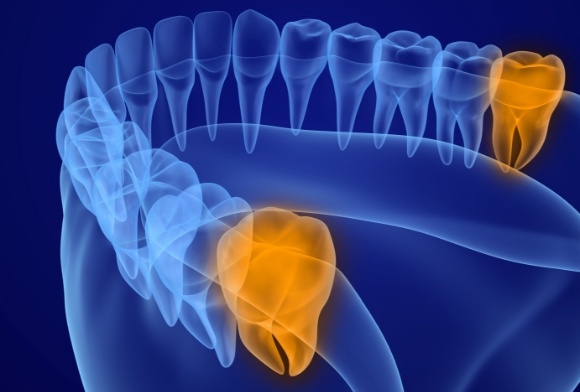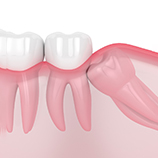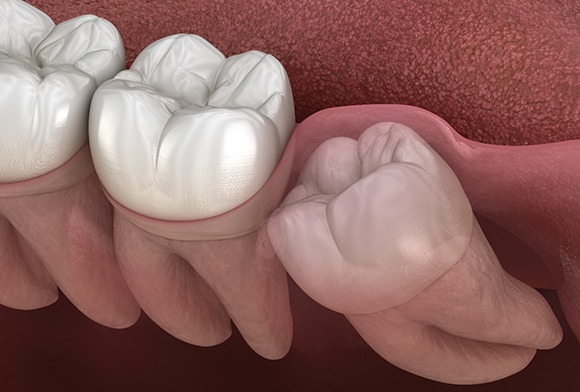Wisdom Tooth Extractions – Carrollton, TX
Do Your Wisdom Teeth Need to Come Out
Our wisdom teeth are the third and final sets of molars that typically come in around the ages of 16-25. If they are properly aligned and healthy, they can be an asset. However, if they are impacted or crooked, that can affect the other teeth in your mouth and will need to be extracted. At Celebration Family Dental of Carrollton, we can offer you the most comfortable wisdom tooth extractions in our Carrollton, TX dental office.
Why Choose Celebration Family Dental of Carrollton for Wisdom Tooth Extractions?
- State-of-the-Art Technology
- Personable, Gentle Dental Team
- Multiple Forms of Sedation
What are Wisdom Teeth?

Wisdom teeth that are growing horizontally can affect adjacent teeth, the jawbone, and even the nerves. They can also trap food particles and cause decay. If they are entrapped in the soft tissue, they can allow bacteria to grow and cause infection. Such teeth are known as impacted teeth, and they may need to be extracted before they cause more problems.
The Wisdom Tooth Extraction Process

When you come to see us showing symptoms of pain and discomfort due to your wisdom teeth, we will first take X-rays to understand the exact positioning of your wisdom teeth. We’ll then numb the area with a local anesthetic. If the wisdom teeth have fully erupted, they can be extracted like any other tooth. If they are embedded in the gums and jawbone, we will make a small incision in the jawbone to access the tooth.
Wisdom Tooth Extraction After Care

Bleeding may occur during the first 24-hours after the procedure. It can be controlled by softly biting on a moist gauze pad. Do not rinse your mouth and refrain from drinking with a straw for 24 hours. Stay away from hot and hard foods as well. Use an ice pack to reduce any pain and swelling. Painkillers will be prescribed to control pain.
Understanding the Cost of Wisdom Tooth Extractions

If you’ve been expecting to have your wisdom teeth removed at some point, you’ve probably already given some thought as to how much the procedure will likely cost. Of course, the only way to know for sure is to speak to our team members so that they can give you an estimate that takes the specifics of your situation into account. That said, when it comes to the financial aspect of the wisdom tooth extraction process, it’s worth keeping the following facts in mind.
Factors That Can Impact the Cost of Wisdom Tooth Extractions

When you first visit our office to discuss a wisdom tooth extraction, we’ll need to gather information about your mouth before we can figure out what the procedure will look like and how much it will cost. Here are just a few of the things we’ll look at:
- The Number of Teeth Involved with the Procedure: Some people have fewer wisdom teeth than others. The number of teeth that actually need to be removed will affect the amount you pay.
- Whether the Wisdom Teeth are Impacted: If the wisdom teeth have fully emerged, it may be possible to remove them with a simple extraction. But if they’re impacted (meaning they haven’t been able to erupt through the gums), a more costly surgical extraction may be required.
- Whether You Need Sedation: If you’re nervous about your wisdom tooth extraction, you might choose to have dental sedation performed. This incurs a separate cost from the procedure itself, and the type of sedation used makes a difference when it comes to the price.
- Whether a Specialist is Needed: Sometimes it may be necessary to have an outside specialist handle a particularly complex extraction procedure, which might add to the cost.
Does Dental Insurance Cover Wisdom Tooth Extractions?

Dental insurance plans often do help pay for wisdom tooth extractions. The coverage could be as low as 50% or as high as 80%; the exact amount is influenced by factors such as what plan you have and whether surgery is required.
We gladly accept most major PPO plans, and we’re in-network with Cigna, Delta Dental, and other popular providers. You can count on our team when it comes to filing your claims and making sure you get the benefits you deserve.
How to Make Wisdom Tooth Extractions Affordable

Besides insurance, there are a couple of other ways to make paying for wisdom tooth removal easier:
- Dental Membership Plan: One of the advantages of signing up for our in-house dental membership plan is that you can enjoy a 15 percent discount on a variety of necessary procedures.
- Financing: Are you familiar with CareCredit? This third-party financier can make wisdom tooth extractions less of a strain on your budget thanks to their low-to-no-interest payment plans.
Wisdom Tooth Extractions FAQs

Typically, when patients get a wisdom tooth extraction, it’s the most substantial kind of dental work that they’ve ever received. This often leads people to be nervous about what the procedure entails and to have questions about how best to handle the treatment.
At Celebration Family Dental of Carrollton, we work hard to make every treatment, including wisdom tooth extractions, as stress-free as it can possibly be. To that end, here are answers to some of the questions we get most often about how to handle wisdom tooth extractions.
How Should I Prepare for My Wisdom Tooth Extraction?
We’ll give you detailed instructions for how to handle preparing for your tooth extraction when we meet you in person, and the best way to make sure that the procedure goes well is to follow those guidelines as best you can. The details may vary, but some common advice includes:
- Don't eat or drink the night before receiving anesthesia.
- Stock up on soft foods for after the surgery.
- Wear comfortable clothing to the surgery, and wear glasses instead of contacts.
- Get a ride to and from the office—you can never be sure how anesthesia will affect you.
- Avoid smoking for at least 12 hours before the surgery.
- Let us know about any medication you take, as many can conflict with the anesthesia.
How Long Does Wisdom Tooth Surgery Take?
First of all, it’s worthwhile to note that you’re likely to be sedated for the duration of your surgery. As a consequence, you’re likely to feel like time hasn’t passed at all.
That said, it typically takes around 15-20 minutes to completely remove a wisdom tooth, so removing all four should only take 90 minutes at the most. Certain kinds of wisdom teeth are harder to deal with, like those that are impacted. We’ll be able to give you a bit of a better idea of the timeline of the procedure when we meet you in person.
When Can I Use a Straw After Wisdom Teeth Removal?
We strongly recommend against using a straw for the first few days after wisdom tooth removal. The suction involved can pull the emerging clot out of place and disrupt the healing process, a condition known as dry socket.
While the exact length of time varies depending on your capacity to heal, the general consensus is that you need to wait at least two or three days before drinking with a straw. We’ll be able to tailor this advice to you once we review your medical history more thoroughly.
Do Wisdom Teeth Stitches Dissolve?
It’s nearly always necessary to stitch up the wound after the removal of a wisdom tooth to allow for speedy healing. These stitches are typically made of a fabric designed to dissolve after a few weeks, but the time frame for that can vary a little bit.
There are, however, some stitches that don’t dissolve on their own. If you’ve gotten these, you’ll usually have to return to our office seven to ten days later to have your stitches removed.
Why Do We Have Wisdom Teeth?
Wisdom teeth are an evolutionary redundancy that’s stuck around for thousands of years despite them not being useful anymore. It’s kind of like your appendix or your tailbone. Neither of these structures does anything for your body now, but your distant early-human ancestors may have needed them for survival. Wisdom teeth were used in a time when mankind still foraged for their food and ate a diet of tough nuts, raw meat, and other foods that required extra grinding. Today, we have modern conveniences, food processing, and the ability to cook, so wisdom teeth are no longer necessary, especially as our jaws have shrunk over time.
Is Wisdom Tooth Removal Painful?
Without modern anesthetics or techniques, it might be. However, at Celebration Family Dental of Carrollton, our first priority is your comfort. This is why we use local anesthetics to numb your mouth before the procedure begins. At most, you’ll feel some pressure or discomfort as your tooth is gently rocked back and forth to loosen it. Over the next few days, you may also experience some soreness in your jaw, but this is normal and should subside within a week. In the meantime, you can use a cold compress and over-the-counter pain medications like ibuprofen and acetaminophen to control swelling and achiness.
What’s the Best Age to Get Wisdom Teeth Removed?
While there’s no specific age at which everyone should get their wisdom teeth removed, we recommend extraction soon after their development. While it’s possible that you may never have dental issues related to your wisdom teeth, it’s better to be safe than sorry. The risks associated with leaving them generally outweigh the benefits of taking them out. These include impaction, damage to adjacent teeth, and a higher risk of dental decay or the development of oral cysts. The longer your wisdom teeth settle into your mouth, the more difficult it can be to remove them, so it’s better to do it sooner than later.
I am Looking for a New Dentist I Need Help with Cavities or Broken Teeth I Need Assistance Getting Out of Pain I am Interested in Replacing Missing Teeth I Have a Major Life Event Approaching I'm Searching for a Dentist Who Loves Kids I am Worried About Gum Disease I am Anxious/Afraid of the Dentist View Our Services
